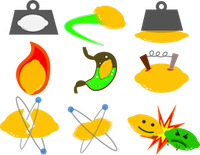Energy is the only universal currency.
— Vaclav Smil
Energy is a very subtle concept… very, very difficult to get right… we have no knowledge of what energy is.
— Richard Feynman
2013 Syllabus
Course Description
[ITPG-GT2466]
 Energy has been called the “universal currency” (Vaclav Smil) but also “a very subtle concept… very, very difficult to get right” (Richard Feynman). Building on skills developed in physical computing, we will, through generating and measuring electricity, gain a more nuanced and quantitative understanding of energy in various forms. We will turn kinetic and solar energy into electrical energy, store that in batteries and capacitors, and use it to power small projects. Several sessions will include hands-on labs. We will develop skills useful in a variety of undertakings, from citizen science to art installations, and address a range of topics through the lens of energy. Students will build a final project using skills learned in the class.
Energy has been called the “universal currency” (Vaclav Smil) but also “a very subtle concept… very, very difficult to get right” (Richard Feynman). Building on skills developed in physical computing, we will, through generating and measuring electricity, gain a more nuanced and quantitative understanding of energy in various forms. We will turn kinetic and solar energy into electrical energy, store that in batteries and capacitors, and use it to power small projects. Several sessions will include hands-on labs. We will develop skills useful in a variety of undertakings, from citizen science to art installations, and address a range of topics through the lens of energy. Students will build a final project using skills learned in the class.
Contact
jfeddersen [at] gmail [dot] com Please use this email and not my NYU address as I get this immediately.
Office Hours
TBD. In addition to on-floor hours, I’m open to any and all ways to stay in touch through the semester, so email, call, chat, hangout, etc.
Goals
1. Develop a broad perspective and nuanced understanding of energy sources and flows.
2. Become well-versed in the current state of the art in energy conversion and storage, as well as relevant near- and far-term technologies.
3. Gain the skills necessary to create projects utilizing ambient energy supplies, and to measure and monitor the energy usage in those projects.
4. Develop midterm and final projects that thoughtfully engage energy concepts.
Student Documentation
Documenting the work of this class in an online format is required. At a minimum, presentation materials for your weekly discussion and projects (kinetic, solar, and final) should be online by the time they are presented. You may provide additional documentation (e.g. of process, etc.) as you see fit. How/where you put the documentation is up to you, but please provide a single link from which I can access any of your work for this class, and only the work for this class. That means if you’re using a blog, for example, set up a category or tag scheme so there is a single-page archive of all class-related entries. It’s too easy to miss documentation when it is mixed in with all your other work.
Assignments
Consistent Participation [25%]
Your active and engaged participation in the course is vital, as is your on-time attendance. Students should not miss class or be late; to do so jeopardizes your grade. Readings and additional materials will be discussed in each class, and you should be prepared and familiar with the topics at hand. Small weekly assignments will be posted each week on the syllabus which will inform in-class activities.
Energy R&D Presentation [15%]
Each student will sign up to present information about an energy-related topic of their choice. The subject could be just about anything, but you should:
- research your topic, citing sources. Give yourself enough time to digest your material, so we’re not hearing your unorganized thoughts
- place energy and power numbers in perspective, using the SI units we use in class, and
- document your topic to serve as a class reference
This year, the format of the research could be:
- A standard presentation e.g. keynote, etc.
- A hands-on demo of interesting tech, with supporting documentation online
- A static visualization (or sonification? or ?) of energy data, or
- A dynamic visualization/sonification of energy data
Midterm project [25%]
Create a device that performs a function (useful, ridiculous, or in between), without primary batteries and without plugging in. Midterms will be presented in week 7 (March 14th). Additional details about the midterm requirements will be given in the syllabus.
Final Project [35%]
Working throughout the semester you will conceive, execute, and present a larger project. This project will be done individually or in groups of two to three. You are encouraged to use the department’s portable solar kits. Details will be provided in the syllabus, and we will collectively develop meaningful constraints for the project at the beginning of the semester.
Readings
Energy: A Beginner’s Guide
Vaclav Smil
2006, Oneworld Publications
ISBN: 978-1851684526
We’ll be using this excellent text as a the main reading for the course. It provides a wealth of technical detail in a cross-disciplinary context. I’ve found no other text that strikes the same balance. Smil has published a number of other works on the topic. The Beginner’s Guide should be available through the NYU bookstore for about $15.
Barnes & Noble and Amazon have it for a less. There are also Kindle and Nook versions.
There will be additional reading materials assigned throughout the course. Details will be provided in the syllabus.
ITP Resources
Sustainability wiki
Physical computing wiki
Solar Resources Page
NYU/Poly ACRE Clean- Green-tech incubator
Spring 2012, Spring 2011, Spring 2010, Spring 2008, Spring 2007 and Fall 2004.